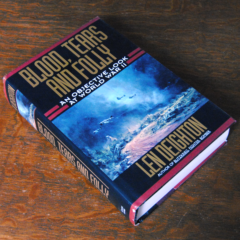
Blood, Tears and Folly, An Objective Look at World War II by Len Deighton doesn’t pull punches on any side or any of the conflicts of World War II. In Blood, Tears and Folly, he tells the facts as they are, filled with ego and delusion, stupidity, idolatry, and simple wanton greed.
This is a history lesson in six parts: The Battle of the Atlantic, Hitler Conquers Europe, The Mediterranean War, The War in the Air, Barbarossa: The Attack on Russia, and Japan Goes to War.
The book is generally sequential, but it does bounce around. Deighton starts with early fighting in a region and follows it to its turning point or end before moving somewhere else. This streamlines the reading, but it does rely a bit more on the reader’s memory as the war unfolds and time sometimes turns back.
This is important because this book isn’t a retrospective. It isn’t a what-happens-because-of-this book; it’s a how-did-we-get-here book. He sets up this objectivity in the intro writing, “Delusions are usually rooted in history and all the harder to get rid of when they are institutionalized and seldom subjected to review. But delusions from the past do not beset the British mind alone. The Germans, the Russians, the Japanese and the Americans all have their myths and try to live up to them, often with tragic consequences.”
This book is all about smashing myths. I’ve read other histories of World War II battles, but none were quite as thorough as this. Deighton appears to have written a highly objective version that may be much closer to the truth than what is taught in schools that have become myth. Many names on both sides are tarnished.
To steal a phrase from the UK, this “Objective Look at World War II” does what it says on the tin.
Based on the premise of ego, greed, and even more ego, there are decisive moments in the battle as we know it that were not influenced by what was happening. At one point, Deighton calls this a “self-destructive delusion of grandeur.” But it’s not just about one’s enemy. Navies, armies, and air forces on all fronts made decisions with their own best interests in mind – not their countries’ but their organizations.

Author Len Deighton
The scarier piece is that it could happen all over again today. Proving my point, something quite relevant to our modern media appears in the introduction where Deighton writes, “Newspapers and television did little to counteract the artful management of news at which crooks and tyrants have become adept. Orthodontics and the hair-dryer have become vital to the achievement of political power.”
Sounds familiar, doesn’t it?
Deighton calls himself an amateur historian, though as he writes in the introduction, “This book, like Fighter and Blitzkrieg before it, would never have seen publication without the late A.J.P. Taylor, who told me that an amateur historian is an historian nevertheless.”
I want to simultaneously tell you to read all of those books and give thanks to the late A. J. P. Taylor, because Blood, Tears and Folly, Fighter, Blitzkrieg, and Battle of Britain are all great in their own right. Since this is the last of the non-fiction books, aside from the cookbooks, it’s worth noting that this “amateur historian” put that knowledge and research to use in every other book he wrote.
The details in this book of non-fiction will ring authentic when inserted into his works of fiction, which perhaps is why those pieces are so believable. Storytelling aside, Blood, Tears and Folly remains firmly focused on the facts around the decisions and the decisive moments of World War II.
Read the Secret File of technical information and quotes from Blood, Tears & Folly by Len Deighton.